June 21, 2025 | 03:46 GMT +7
June 21, 2025 | 03:46 GMT +7
Hotline: 0913.378.918
June 21, 2025 | 03:46 GMT +7
Hotline: 0913.378.918
In many meetings of Ha Tinh People's Council in 2018 and 2019, when it was the turn to question the Director of the Department of Agriculture and Rural Development, the parliament was always pressing the situation of fishing trawlers catching onshore or inland areas, and eradicating water resources, causing frustration among the people. That was also the time when the fisheries industry focused on implementing solutions to remove the IUU "yellow card".
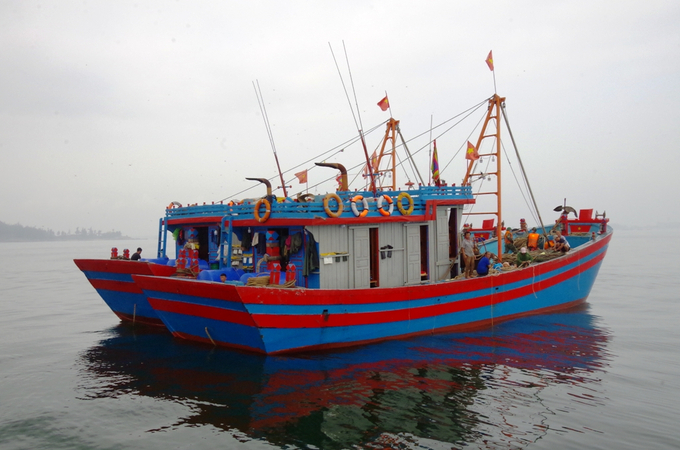
The fishing trawlers eradicating water resources used to give trauma to fishermen operating in the coastal areas of Ha Tinh. Photo: Thanh Nga.
Back to the present time, Head of Ha Tinh Fisheries Sub-Department Nguyen Cong Hoang said, “The rate of fishing trawlers fishing in the wrong area, wrong route, using explosives and banned fishing gear has decreased by about 70% compared to 2018 and 2019. However, we will continue to strengthen patrols and pursuits, avoiding the case when the competent forces are inattentive and fishermen violate the law again”.
According to Colonel Nguyen Mau Phuc, Political Director of Ha Tinh Border Guard Service, the agriculture and rural development sector has the main responsibility in the work against IUU fishing, but in the process of coordinating the fishing trawlers' pursuit at sea, the border guard forces play a crucial role in suppressing and deterring violating fishing vessels. Information dissemination work is regularly deployed by stations in many forms, which has partly changed the perception of fishermen.
"We are the ones who directly ‘guard’ right at the sea mouth where fishermen go in and out to exploit and conduct trade, so it is somewhat favorable to grasp the information about crimes and violations to organize pursuit, arrest, and handle,” said Colonel Nguyen Mau Phuc.
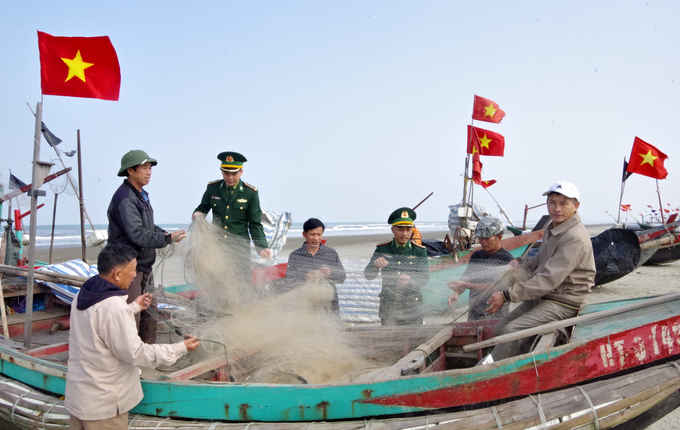
The close cooperation between Lach Ken Border Guard Station and fisheries co-management groups has effectively contributed to confronting the issues of fishing trawlers. Photo: Thanh Nga.
Statistics show that Ha Tinh Border Guard arrested 17 cases/38 fishing trawlers in 2020 with administrative fines of VND 469 million. In 2021, there were 21 cases with 44 vehicles arrested, and a fine of more than VND 447 million was imposed. Particularly in 2022, the functional forces detected and handled 26 cases involving 33 individuals/32 vehicles, in which Ha Tinh Border Guard Service detected and handled 16 cases/25 vehicles, and imposed an administrative fine of more than VND 436 million.
Lach Ken Border Guard Station (Nghi Xuan district) is one of the leading units in 2022 that coordinated very well with functional forces and fishermen to detect and arrest fishing trawlers violating the Law on Fisheries.
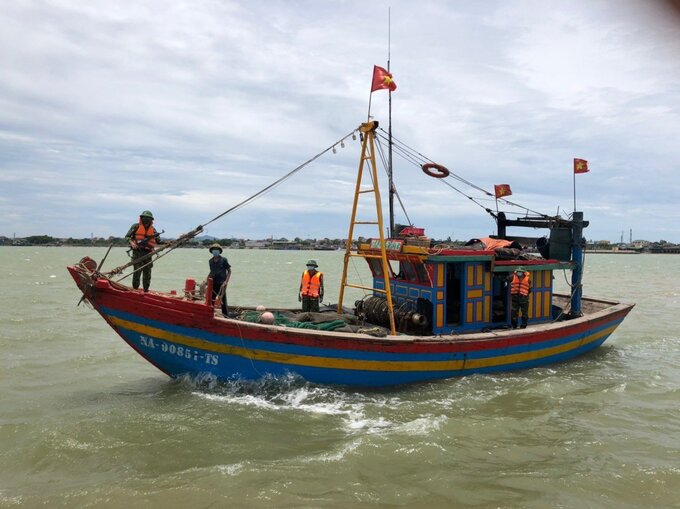
The patrol and surveillance at sea are organized regularly and continuously by the border guard.
According to Lieutenant Colonel Ho Manh Hung, Politician of Lach Ken Border Guard Post, the unit is tasked with managing the 32 km long coastal border with 9 coastal communes of Nghi Xuan district. While performing the mission, the border guard force frequently detects illegal fishing activities from fishing vessels of other provinces, especially those in Thanh Hoa and Nghe An.
The operation of large-capacity fishing trawler fleets receives keen attention from the border guard as they fish in the wrong area and wrong route, affect the ecological environment, exhaust resources, and even pull the fishing nets of other traditional fishermen in coastal and inland areas.
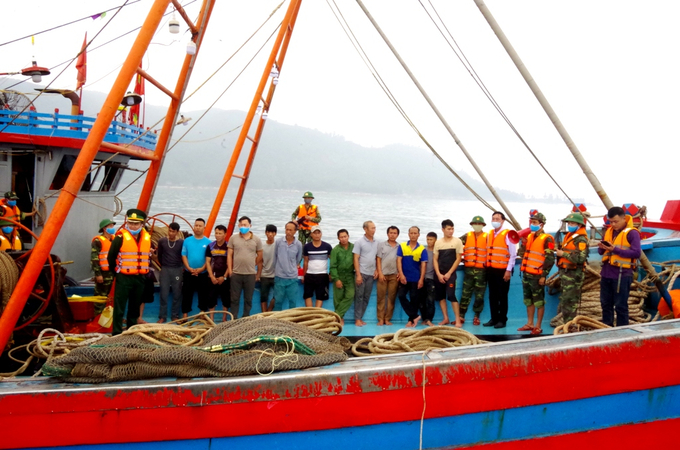
Pair fishing trawlers exploiting the wrong area, the wrong route was arrested by the border guards of Thien Cam station and subjected to heavy punishment. Photo: Thanh Nga.
To prevent this situation, the soldiers of Lach Ken border station regularly coordinate with the Nghi Xuan district Department of Agriculture and Rural Development and the fishing co-management groups to patrol the sea to maintain security and order, also promptly detect and arrest violating fishing vessels. From 2019 until the present date, Lach Ken Border Post has arrested and handled 39 cases with 39 illegal fishing vessels and administrative fines of more than VND 538 million.
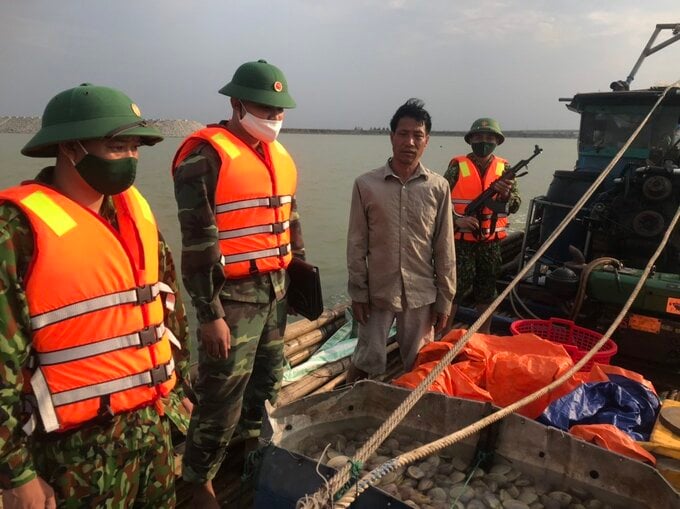
The role of the border guard force in IUU fishing prevention is indispensable.
The rate of fishing trawlers violating IUU regulations in Ha Tinh waters has "shrunk" and decreased year after year, but in order to achieve sustainable fisheries in the long run, the authorities need to continue to carry out regular patrols and pursuits, especially in the peak months of the fish breeding season.
Above all, fishermen must be aware that fully complying with the provisions of the Law on Fisheries means that they are protecting their path to “bring food on the table”. All relevant individuals and units need to join hands with great efforts to remove the IUU "yellow card" in 2023.
Translated by Samuel Pham
![Turning wind and rain into action: [9] Digitizing hydrometeorological data in response to climate change](https://t.ex-cdn.com/nongnghiepmoitruong.vn/608w/files/news/2025/06/17/z6704423696987_15fd32ffc26d590d204d520c9dac6786-nongnghiep-165943.jpg)
(VAN) Farmers have begun accessing hydrometeorological applications to adjust their cropping schedules, aiming to ensure productivity and adapt to climate change.
![Turning wind and rain into action: [8] Real-time salinity detection and early warning technology](https://t.ex-cdn.com/nongnghiepmoitruong.vn/608w/files/news/2025/06/17/z6704423696987_15fd32ffc26d590d204d520c9dac6786-nongnghiep-151127.jpg)
(VAN) Thanks to the integration of modern hydrological-hydraulic models, remote sensing technologies, and artificial intelligence, the accuracy of hydrological forecasting has significantly improved.
![Turning wind and rain into action: [7] Early disaster warnings help marine farmers minimize losses](https://t.ex-cdn.com/nongnghiepmoitruong.vn/608w/files/news/2025/06/17/z6704423696987_15fd32ffc26d590d204d520c9dac6786-nongnghiep-142942.jpg)
(VAN) In recent years, thanks to early disaster warnings and forecasting, marine farmers in Khanh Hoa province have been able to reduce risks and losses, thereby improving production efficiency.
![Turning wind and rain into action: [6] ‘Four on-the-spot’ disaster management software](https://t.ex-cdn.com/nongnghiepmoitruong.vn/608w/files/news/2025/06/17/e5a48259d6a262fc3bb3-nongnghiep-183800.jpg)
(VAN) By simply activating the scenario on the disaster management software, the relevant authorities immediately know how many households need to be evacuated, where to evacuate them to, and by what means of transportation…
![Turning wind and rain into action: [5] Hue applies modern technology in disaster forecasting](https://t.ex-cdn.com/nongnghiepmoitruong.vn/608w/files/news/2025/06/17/z6704423696987_15fd32ffc26d590d204d520c9dac6786-nongnghiep-093938.jpg)
(VAN) In Hue city, modern technology has recently been applied in meteorological and hydrological forecasting and warning, helping to reduce the damage caused by natural disasters.

(VAN) A cutting-edge farming technique being implemented on an experimental ranch in Arizona's Sonoran Desert has already saved a billion gallons of water over five years, according to Civil Eats.

(VAN) Poultry and pig production and the environment can be boosted through enhanced water technology, according to new research.